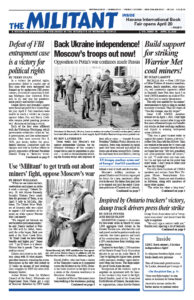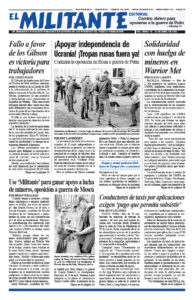As the invading army of Russian President Vladimir Putin commits atrocities against the Ukrainian people, how should working people who are seeking to defend Ukrainian independence approach Russian soldiers? Are they complicit with the Putin regime? Or is it possible to win the ranks of the Russian army — workers and farmers in uniform — to oppose the invasion and hasten the victory of the Ukrainian resistance?
This is not a new question. The attitude toward the U.S.-backed Fulgencio Batista regime’s soldiers was decisive for Cuban revolutionaries in the 1950s.
When Fidel Castro and the July 26 Movement began the guerrilla struggle in Cuba in 1956, they confronted Batista’s well-equipped army, air force and navy. The dictatorial regime had some 20,000 soldiers and large supplies of tanks, bombs, rockets, napalm and other weapons, supplied by Washington. All the guerrillas had were some rifles and a political program aimed at uniting working people across the island. But it wasn’t long before they were dealing defeats to their much larger adversary.
A question of moral values
In a radio broadcast to the Cuban people on Aug. 19, 1958, Castro explained the key to their advances: “Victory in war depends on having a minimum of weapons and a maximum of moral values,” he said. “The victories obtained through our weapons without assassinating, torturing, or even interrogating an adversary proves that committing outrages against human dignity can never be justified.
“War is not simply a question of rifles, bullets, cannons and airplanes,” Castro said. “Maybe that belief is one of the reasons of the failure of the tyranny’s forces.”
“Why don’t we kill the soldiers we capture?” Castro asked. “First because only cowards and thugs murder an enemy who has surrendered.” Wounded soldiers were never mistreated. They received the same medical care as wounded rebel fighters.
“Second, because the Rebel Army cannot fall into the same practices of the tyranny it is fighting,” Castro said. He pointed out that the Batista dictatorship tried to convince its soldiers the rebel fighters would kill any of them they captured in attempt to get the soldiers to fight for the dictatorship “until the last drop of blood.”
Castro instructed Radio Rebelde to always “stick to the truth,” never “hide our casualties” and never “exaggerate the enemy’s casualties because the cause of freedom cannot be defended with lies.”
These were not just words. This was the way the Cuban revolutionaries conducted themselves, including in the most difficult moments of the war. It stands in sharp contrast to the conduct of the capitalist rulers worldwide from Washington to Moscow. The conduct of an army reflects the morals and the goals of the class that commands it. An army mobilized by the dog-eat-dog bosses’ government will advance methods that show utter contempt for the lives and conditions of working people in or out of uniform.
In Cuba the goal of the Rebel Army was never to kill the maximum number of soldiers, but to defeat the dictatorship with the minimum cost in human lives.
In an interview with Ignacio Ramonet, Castro described the importance of this approach. “When an enemy comes to admire and respect its adversary, you have achieved a big psychological victory. He admires you because you have defeated him, because you have dealt strong blows, but also because you have respected him, because you did not beat a single captured soldier, because you did not humiliate him, you did not insult him.”
The revolutionaries reached out to the regime’s soldiers in lulls in the fighting, and whenever possible, to tell them the truth about the program and goals of the revolutionary movement, exposing the lies of the dictatorship. They explained they were not trying to replace one man, but an entire system of exploitation.
‘To you, soldier of the tyranny’
The Rebel Army front commanded by Ernesto Che Guevara, even printed a special edition of its newspaper titled, “To you, soldier of the tyranny” that explained its values.
The July 26 Movement, Castro said in 1957, was the only force that could be trusted to maintain public order after Batista was overthrown, because the new armed forces “must be imbued with a spirit of justice and nobility that the July 26 Movement has instilled in its own soldiers.”
In July 1958 the guerrillas took several hundred Batista soldiers prisoners. On Castro’s instructions, Guevara proposed a truce to the local army commander so they could hand the prisoners over under the supervision of the Red Cross.
That commander, Captain Carlos Durán Batista, wanted his troops to think those being handed over were rebels. Teté Puebla, a guerrilla fighter involved in negotiating the truce, had to spend the night in the army camp on the eve of the transfer. When the captain fell asleep, she went around to the soldiers and told them the truth.
This working-class course paid off. Morale in Batista’s army plummeted while sympathy for the revolutionary movement among soldiers grew. By the end of 1958 the army was in disarray and Batista fled the country. As Castro and the Rebel Army headed from the Sierra Maestra to the capital, Havana, thousands of soldiers put down their weapons and many traveled alongside the rebel combatants.
The war was over and a new day was opening for the workers and farmers of Cuba.

